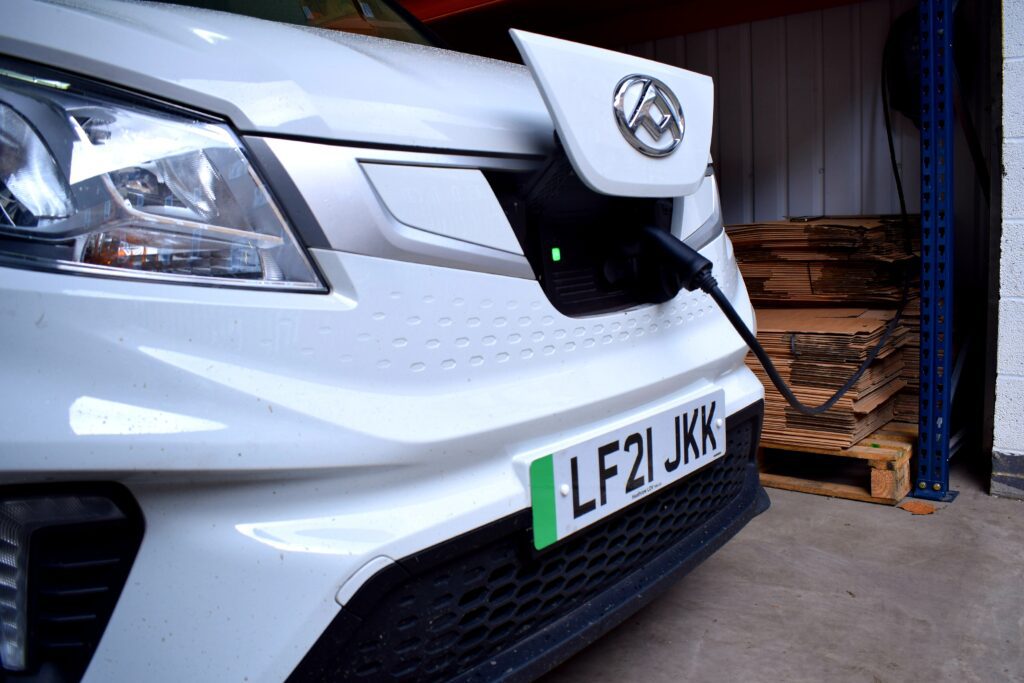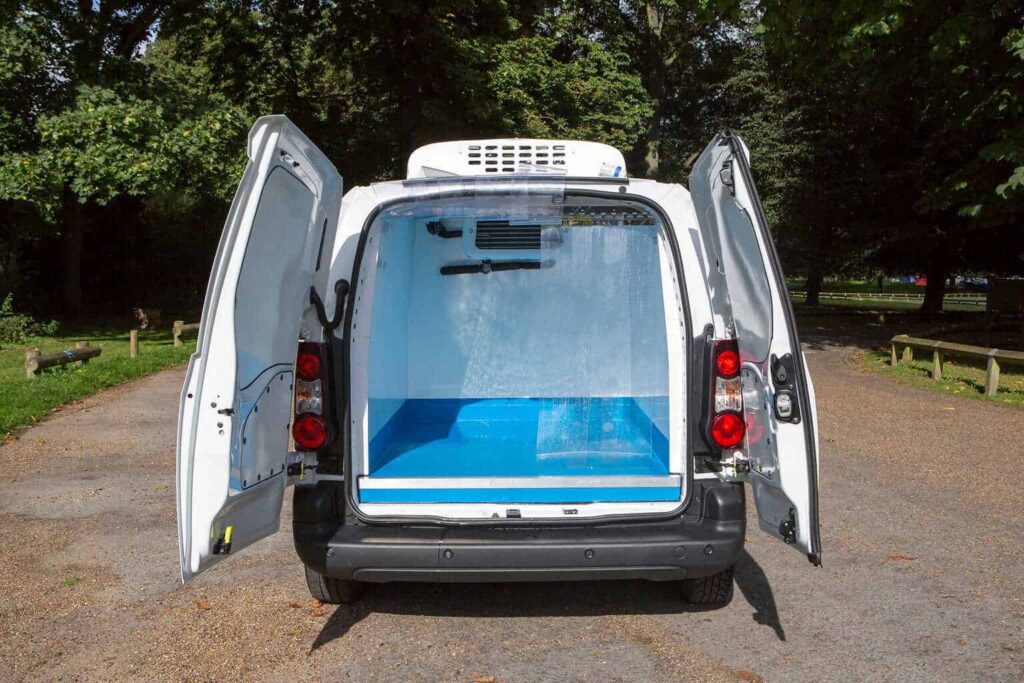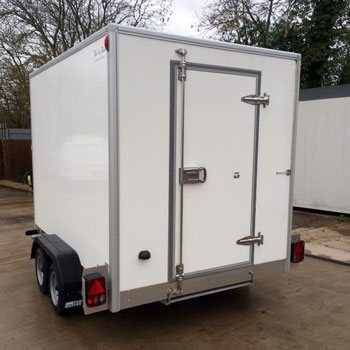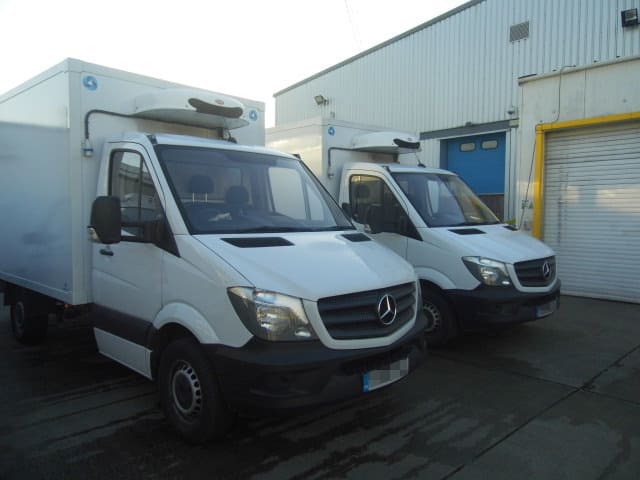More and more businesses are enquiring about how to make their fleet of refrigerated vans more sustainable. The good news is that FridgeXpress has been at the heart of eco-friendly transportation for many years. We were an early investor in electric vehicles (EVs), making them available for our customers across the UK, and have access to EV charging infrastructure for our customers.
In the ever-evolving landscape of transportation, the move towards eco-friendly practices has become critical. All businesses that require one or a fleet of vehicles for their operation are looking for answers around transforming their fleet to electric vehicles.
The adoption of electric vehicles in refrigerated logistics offers numerous benefits, and with advancements in technology over the last decade, there has never been a better time to consider making the transition. In addition, with the expansion of ULEZ, the 2030 ICE vehicle ban, and the ZEV requirements, the pressure is on every business to take the first steps.
Here we explore the advantages and challenges of switching to eco-friendly refrigerated vans while addressing key factors such as changes in regulations, cost considerations, and the current state of recharging infrastructure. The latter is still a major issue for businesses that operate EVs but one that is beginning to evolve and improve rapidly.
The Rise of Electric Refrigerated Vans
In recent years, there has been a remarkable surge in the development and adoption of electric vehicles, and refrigerated vans are no exception to this trend. As concerns about climate change and environmental sustainability grow, businesses are increasingly looking for ways to reduce their carbon footprint and comply with regulations.
Advantages of Electric Refrigerated Vans
If you currently have a petrol or diesel refrigerated van, or you run a fleet, it can be daunting to switch to an electric vehicle. Timing is going to be critical if you are worried about your bottom line but it’s important to think about the real benefits of switching soon.
The most compelling reason for switching to electric refrigerated vans is the substantial reduction in greenhouse gas emissions. Electric vehicles produce zero tailpipe emissions, making them a more environmentally friendly option compared to their petrol or diesel counterparts. Especially in large cities like London, this is becoming increasingly important.
Electric vehicles also have lower operational costs when it comes to fuel and maintenance. Electricity is generally more cost-effective than petrol or diesel, even with the current hike in prices, and EVs have fewer moving parts, resulting in reduced maintenance expenses long term.
The UK government has been actively promoting electric vehicles through various incentives and initiatives. This includes the introduction of Ultra Low Emission Zones (ULEZ) in London and Clean Air Zone (CAZ) across the UK (currently in place in Bath, Birmingham, Bradford, Bristol, Portsmouth, Sheffield and Tyneside, Newcastle, and Gateshead) which imposes charges on high-polluting vehicles and encourages the use of electric alternatives.
Recent advancements in electric vehicle technology have led to longer battery ranges, faster charging times, and overall improved performance. These developments make electric refrigerated vans more viable and efficient for logistics operations making electric vehicles an option for a broader range of businesses. There’s also some evidence to indicate that they hold their value for longer than petrol or diesel vehicles, making them a more valuable asset that can be sold on.
Finally, businesses that embrace sustainable practices and reduce their carbon footprint will reflect a more positive brand identity and can appeal to environmentally conscious customers. This can translate into increased brand loyalty and marketability for the business.
The Evolution of Legislation in the UK
The UK government has been taking significant steps to encourage the transition to electric vehicles and promote more sustainable methods of transportation. One of the most notable initiatives is the introduction of Ultra Low Emission Zones (ULEZ) in major cities like London. ULEZ imposes daily charges on vehicles that do not meet certain emission standards, primarily targeting older, more polluting vehicles. This policy not only incentivises the adoption of electric vehicles for businesses and individuals but will contributes to improving air quality in urban areas.
The government also offers various financial incentives to encourage businesses to switch to electric vehicles. These include grants for purchasing electric vans, reduced road tax rates, and exemptions from certain congestion charges. The aim is to make electric vehicles a more financially attractive option for businesses.
Why Now is the Right Time to Transition
Several factors make the present moment particularly suitable for businesses looking to update their refrigerated van fleet with electric alternatives:
- Advancements in EV Technology: As already mentioned, electric vehicle technology has improved significantly in recent years. Modern electric refrigerated vans offer longer ranges and faster charging, making them more practical for logistics operations. The number of charging points across the UK is also steadily increasing.
- Legislative Support: The UK government’s commitment to reducing emissions and promoting electric vehicles means that businesses can take advantage of various incentives and exemptions, making the switch to electric more financially viable.
- Changing Customer Expectations: As environmental awareness grows among consumers, businesses that demonstrate a commitment to sustainability may gain a competitive edge and attract a broader customer base. We’re all more aware of the impact we have on the environment. Particularly for well-known brands, switching to sustainable operational approaches can have a huge impact on customer loyalty.
Challenges and Considerations
While the transition to electric refrigerated vans holds a good deal of promise, there are also challenges and considerations to keep in mind. Most businesses are going through harder times after the pandemic and with the economy slowing down. Everyone is tightening their belt, including consumers.
Electric refrigerated vans tend to have a higher upfront purchase price compared to their petrol or diesel counterparts. However, this cost difference is gradually decreasing as technology advances and production scales up. There are also other options such as long leasing that can be highly cost-effective.
Although charging infrastructure for electric vehicles is improving, it is not as widespread or as fast as refuelling with traditional fuels. Businesses must carefully plan routes and charging stops to ensure efficiency. A lot depends on the areas to which you deliver and whether the infrastructure is currently in place. Charging options can include workplace, home, on-the-go or a mixture of these and FridgeXpress can help with this.
Electric vehicles have a limited range on a single charge, which may be a concern for businesses with long-distance deliveries. However, this limitation is continually improving with the development of more efficient batteries.
The resale value of electric vehicles, particularly older ones, can be uncertain due to rapidly evolving technology and battery degradation over time. Businesses should consider the long-term implications for their fleet. Newer models, however, do tend to have greater resale value over time.
Is it Right for Your Business to transition to EVs?
The shift towards eco-friendly refrigerated vans, particularly electric vehicles, is an essential step for businesses committed to sustainability and responsible logistics. With advancements in EV technology, evolving legislation, and the potential for cost savings, now is an opportune time to consider transitioning to electric refrigerated vans.
While challenges such as cost and charging infrastructure exist, they are gradually being addressed, making electric refrigerated vans an increasingly viable and eco-conscious choice for businesses across the UK. By making this transition, businesses can contribute to a greener future while enhancing their operational efficiency and competitiveness.
The Benefits of working with FridgeXpress
There are a few reasons why FridgeXpress should be your first choice for refrigerated transport solutions throughout the United Kingdom. With a team of seasoned experts who possess an unmatched depth of knowledge, FridgeXpress assures you have 24/7 access to a trusted and experienced ally in the world of refrigerated logistics.
We take great pride in offering a large fleet of refrigerated vans and trailers, available in a range of sizes, and able to cater to the needs of your business. Whether you operate in the food and beverage sector, deliver pharmaceuticals, or any industry requiring precise temperature control during transportation, we have the perfect vehicle to safeguard the quality and integrity of your goods.
What sets FridgeXpress apart is not only our diverse fleet but also our flexible financing options, including purchase, rental, or lease through a hire purchase agreement.
We understand that each business has its distinct operational footprint, and our aim is to provide a tailor-made solution that aligns seamlessly with your requirements. Our commitment to customer satisfaction ensures that in the event of any unforeseen issues, our team will dispatch a replacement van promptly, minimising disruption to your operations.
If you’re planning to transform your existing fleet to electric vehicles, there is no better partner in the UK than FridgeXpress.




